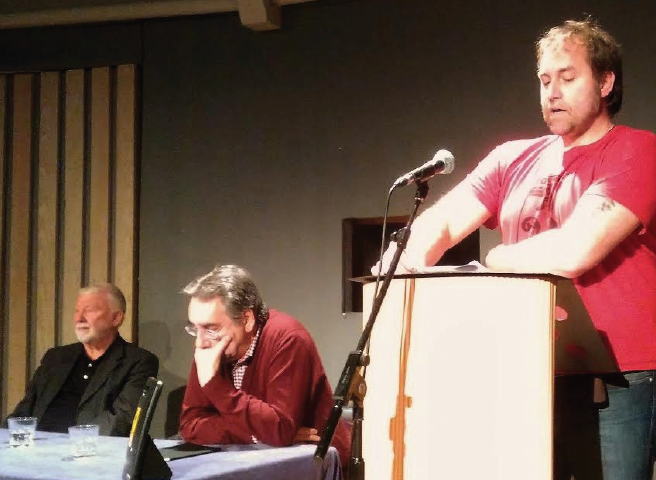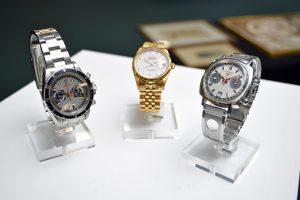
STOP THE WAR Aberystwyth and Ceredigion, a new grouping in the local peace and justice movement, organised a seminar entitled ‘War is Peace – the meaning of imperialism today’.
On Saturday (Sept 22), the seminar took place in the Round Theatre of Aberystwyth Arts Centre. The expression ‘War is Peace’ originates in George Orwell’s novel 1984 as one of the core ‘newspeak’ slogans of the totalitarian party that rules Oceania. That party’s concept of ‘doublethink’ demands that people simultaneously believe both the truth and the falsity of statements without being troubled by the contradiction. And, indeed, perhaps there is none for Imperialism when geography is considered.
Because the argument might be made that war ‘over there’ ensures peace ‘at home’. Conversely, waging wars against distant others may increase the danger to our nearest and dearest. Again, doublethink allows us to believe both of these propositions simultaneously without disquieting ourselves.
In the introduction to the seminar, organiser Johnny Gaunt noted that it is 15 years since the ‘War on Terror’ was launched in retaliation for the devastating 9/11 attacks:
“This war, we were told, was to make us safe. A decade and a half later, and the world is much less safe than it ever was before the attacks in New York. Each country that has been privy to ‘Western intervention’ is in turmoil: Afghanistan; Iraq; Libya; Syria. The repercussions, the rise of ISIS and the sharp increase in global terrorism have become incalculable.”
‘EVIL’ AND WHAT LIES AHEAD
The more than 50 people who attended the seminar heard Professor Ken Booth, senior academic researcher and author on international diplomacy at Aberystwyth University, explore the use of the word ‘evil’ in politics.
John Rees, activist, writer and national officer of Stop the War Coalition, gave his account of UK foreign policy and an analysis of what lies ahead after the US presidency election. Ayla Gol, originally from Turkey, Reader and Director of Graduate School at the Department of International Politics at Aberystwyth University, had been due to talk about Syrian Refugees and Turkey but, unfortunately, had to cancel at the last minute.
BLAIR ‘A POST-TRUTH POLITICIAN’
Ken Booth described the root of war as ‘violent clashes of interests beyond diplomacy’. He noted that many wars do not happen because people disagree on the way they see the situation, rather ‘they agree completely, both parties want the same thing – but for themselves and not for the other!’ Booth’s research shows that there are many reasons for war, with language being one important factor.
He explained how war is justified by the heavy use of words like ‘national interest’, ‘nation state’, ‘independence’, ‘democracy’ and the use of words like ‘inhuman’ and ‘evil’ to describe the ‘enemy’. Calling Blair ‘the first example of a post-truth politician’, Booth explained how Bush and Blair used the words ‘evil’, ‘monster’ and ‘inhuman’ in describing Saddam Hussein, thus effectively barring any possibility of diplomatic resolutions to the situation and justifying their attack upon him because he was not a human being.
Booth views ‘evil’ as a lazy, sensationalist word, used in place of nuanced analysis with accurate words describing a situation. In 1984, Orwell wrote: “But if thought corrupts language, language can also corrupt thought.” In the response to those who clamour for military action, currently focussing on Syria, Ken Booth advocated less military and more diplomatic action and quietly noted that ‘sometimes the best we can do is to help alleviate suffering and apply humanitarian help’.
FAILURE OF THE WAR ON TERROR
John Rees looked at UK foreign policy, condemning the lack of learning from previous experience and the continuous rolling out of the same arguments that caused the problem in the first place.
“We live in the era of failure of the war on terror! We further live in a competitive system with a competitive arms industry, favouring engagement in actions of war rather than diplomacy. Conflict from smaller countries increasingly escalates to larger countries, as can be seen in Syria, with risks of conflict between the US and Russia, both wanting the same thing: access to a friendly base in the area and instability is growing.”
Rees also lamented the lack of accountability and noted the ‘coincidence’ that David Cameron resigned two days before the report on the Syrian intervention. As for future military engagement by the US, Rees believed that Hilary Clinton’s record was consistently hawkish, from her endorsement of the regime change in Libya in 2011, her intervention in the Syrian war from 2012 onwards, and her public glee at the deaths of Gadhafi and Bin Laden.
Her election to the presidency, he suggested, would herald an escalation of intervention in the Middle East and Eastern Europe. “If Trump is elected, nobody knows! He is totally unpredictable on these questions!”
ACTIVISM FOR OPTIMISM
Rees, like Booth, was not overly optimistic about the prospects of a world at peace.
He did, however, propose that the ‘third big global power’ was international public opinion. Public opinion was, he claimed, immensely influential. Despite what many consider a failure of public opinion to stop Bush and Blair’s invasion of Iraq, Rees believed the huge anti-war marches of the time had changed the politics of military intervention.
On February 15, 2003, across the world, an estimated 36 million people marched in around 3,000 protests against the Iraq war. ‘Legitimised’ by the collusion of then Danish Prime Minister Anders Fogh Rasmussen, of course, Bush and Blair pressed ahead with their war plans.
A lifelong activist, Rees described the dilemma that we all face every day: “When I get up in the morning, do I engage or do I ignore?” He concluded that ‘if you fight against war, you may not win, but if you don’t, you certainly won’t!’ Returning again to 1984, Orwell wrote: “It was curious to think that the sky was the same for everybody, in Eurasia or Eastasia as well as here. And the people under the sky were also very much the same – everywhere, all over the world, hundreds or thousands of millions of people just like this, people ignorant of one another’s existence, held apart by walls of hatred and lies, and yet almost exactly the same – people who had never learned to think but were storing up in their hearts and bellies and muscles the power that would one day overturn the world.”

















Add Comment